An Italian Wife Read online
Page 19
“Excuse me,” Aida says so happily the woman shakes her head at her. Two-thirds there. Her eyes scan the station. There must be at least one panhandler here.
Their bus pulls into Gate Eleven as soon as they arrive. From somewhere nearby, Aida can hear a guitar and the soft voices of a man and woman singing in harmony.
“Be right back,” Bill whispers right into her ear, his breath warm.
Aida is tingly with excitement. A kiss on a bus leaving Denver with a tragic hero is even more thrilling than one in a meadow, even in the rain. She sees Bill push his way through the crowd and walk directly to a pay phone.
The couple is singing, “I’ll taste your strawberries . . . I’ll drink your sweet wine . . .”
He is talking, agitated, his face scrunched up in frustration.
The line starts moving forward. People are getting on the bus, and Aida worries that Bill will not even notice.
A scratchy announcement calls passengers for the bus to San Francisco, and Aida starts waving like crazy. But Bill has his back turned and can’t see her.
The bus is right there, waiting, the front like a grinning cartoon bus. Above the window, Aida watches the sign shift from DENVER to SAN FRANCISCO. Behind her, she hears thundering footsteps, Bill’s voice calling for her to wait up. Is there a kiss coming? Or is he going to simply wave good-bye as the bus pulls away? She keeps moving forward; she has to.
Someone tugs at her arm and she turns, expecting to see Bill. Instead, it is a dirty girl, not much older than Aida herself. Dirty bare feet, tangled blond hair, a peasant blouse with unraveling embroidery. Beside her is a bearded boy, also dirty, also barefoot, a guitar slung over his shoulder.
“Did you like our singing?” the girl is asking, but all Aida hears is Bill trying to get through the crowd, calling her name.
“My name is Melody,” the girl says. She holds a wilted daisy out for Aida, her hand trembling.
“Melody,” she says again, smiling in a way that makes Aida think of her sister Teresa, stoned and foggy.
Aida takes the flower and, unsure what to do with it, tucks it behind her ear.
“Pretty,” the girl says, forcing a smile. “Maybe a couple quarters for the flower? Your boyfriend will like it there.”
Aida is at the bus door now, the girl pressing against her.
“Get that fucking hippie out of the way,” someone in the line says.
“It’s worth a dollar,” the girl is saying.
Aida grins at her. The girl, Melody, is a panhandler. She is asking Aida for change. Out of breath, Bill reaches her finally. “Shit,” he says. “Thought I was going to miss the bus.” He takes Aida’s elbow in his hand and hoists her up the steps of the bus.
Aida pulls her loose change from her pocket and manages to drop it in Melody’s grimy outstretched hand.
“Peace,” Melody says.
“Get the fuck out of my way,” Aida hears someone say. But she is on the bus, and Bill is right behind her, a sheen of sweat on his forehead.
“You were just going to go,” he says. “Without me.”
Aida shrugs.
There are people ahead of her putting bags in the overhead racks, and people behind her, urging them on.
Bill takes her face in both of his hands and kisses her hard and quick on the lips.
“Wait for me next time, okay?” he says.
“You can make out when you sit down,” that same guy shouts, and some of the passengers giggle.
But Bill doesn’t move. “Okay?” he says again.
There’s a window seat still available, and Aida slides into it.
Bill is still standing there, waiting.
“Okay,” she says.
He slides into the seat beside her, stretches his long legs. Aida places her hand in his sweaty one, and looks out the window. The sun is up, full and white, over the mountains. The bus backs up slowly, then lurches forward.
IT IS NIGHT and they are somewhere, but Aida has lost track. What is after Colorado? She tries to remember but can’t. Her lips still vibrate from that one fast kiss, like a beesting. If he doesn’t kiss her again soon she might die from anticipation. But he doesn’t seem at all in a kissing mood. Instead, he is telling her an unbelievable story about a group of pioneers who got caught in a freak spring snowstorm in the mountains and ended up having to eat each other.
“They did it for survival,” he says. “People will do anything to survive.”
“You got that right,” a woman behind them says, and Bill laughs softly.
Another woman says, “I heard about this sports team somewhere, in Argentina or Australia or somewhere who ate each other. They were in a plane crash, and they were up in the mountains, and those dead ones just got eaten.”
She is certainly not going to be kissed when the whole bus is in on her conversation.
“See?” Bill says softly. He tucks a strand of her hair behind her ear and she gets a surge of excitement again. “Cannibals are everywhere,” he whispers.
Aida smiles despite herself.
He laces his fingers in hers. He leans close to her, bends his head, and nibbles her neck playfully. “Yum,” he murmurs. “Delicious.”
Aida stiffens. As much as she wants to kiss him, she doesn’t know really what it all involves. The bus is dark and safe, but what if he wants to make out? What exactly does that entail? This, she supposes as his lips move from her neck, slowly, kissing her chin and then finding her mouth. This time, when he kisses her, it is soft and slow. I am a person kissing a boy on a bus, Aida thinks with awe.
Bill’s tongue slips inside her mouth and she tries to remember what she should do. Her friend Linda Martino made out with a boy at the Portuguese carnival last summer. She told Aida how their tongues poked at each other like two snakes. Relieved for this tidbit of guidance, Aida lets her own tongue meet his.
But he doesn’t kiss her again, and Aida wonders if perhaps she is a bad kisser. Maybe she should have held her tongue flat in her mouth. Maybe Linda Martino lied to her. Linda had also said that the boy felt her up over her shirt. That part, Linda said, was stupid. He just rubbed at her purple poorboy shirt and it was incredibly boring.
Bill puts his hand on Aida’s knee. She feels it there, heavy and warm, convinced that he had called Beth from Denver and told her good-bye once and for all.
FOR THE NEXT TWO NIGHTS, Aida sat waiting for more kissing, her body both rigid and melting, afraid and ready. But Bill did not kiss her again, and on the night before the morning they are going to arrive in San Francisco, she is certain she is the worst kisser in the world. Hadn’t Linda Martino said their tongues had poked like two snakes? And Aida had arched her tongue and met his, imitating the way she’d seen snakes on Wild Kingdom.
They are somewhere in California, driving down a deserted highway, when the bus driver slows.
“Uh,” he says into the microphone, “we got a problem.”
There is a clunk and a grinding, and the bus swerves into the breakdown lane.
“Uh-oh,” Bill says, “I hope we don’t have to eat each other to survive.”
Aida rolls her eyes. She thinks she might hate him.
The bus driver is on some kind of radio, describing the noises the bus made, his voice urgent. Then he says, “We ain’t going nowhere.”
Speaking into the microphone again, he says, “Uh, people, we’re stuck here for a while. You can get off the bus if you want. These here are lettuce fields. Just watch out for trucks and things coming down the highway.”
Passengers moan and complain. Some get off the bus right away, but they stand close to it, staring out over the lettuce fields. A man starts yelling at the bus driver, telling him he needs to be in San Francisco, he needs to!
“Do you want to stay on the bus?’ Bill asks Aida.
She wants him to kiss her again, that’s all she wants, so she says nothing.
“Let’s walk a little bit,” he says.
They leave the bus. It is so dark that
Aida feels disoriented, off-balance. Bill takes her hand, whispers, “Careful.”
The dirt in the lettuce field is dry and cracks under their weight. Her eyes start to adjust and she can make out neat rows of lettuce on either side of the path they walk down. They don’t wander too far from the bus, which sits in the distance looking lopsided and broken.
“Feels good to be away from buses,” Bill says.
Aida believes that she could ride these buses without ever stopping, Bill sitting beside her, America whizzing past.
“Rice paddies,” Bill says. “Rice paddies are beautiful. Like works of art.”
He is quiet a moment. Aida wonders if Beth wouldn’t listen to him when he strayed like this, his voice dreamy and distant. Maybe Beth was afraid of what he had seen. But Aida isn’t.
“I don’t know anything about it,” she whispers. “Tell me.”
Bill tucks her hair behind her ears again and says her name the way you say it in the opera. Then he finally kisses her again, not slow this time but right away opening his mouth, his tongue finding hers. He is kissing her with an urgency that almost frightens her. His breathing is sharp, his hands clutch her back, pulling her close enough to him that she feels the buttons on his shirt digging into her and the hardness in his khakis against her.
Bill tugs her down to the dirt with him. It doesn’t smell like Mama Jo’s garden back home, but more like dust.
They kiss for a long time. This, Aida realizes, is making out. She believes there must be an order to things, and that Bill will start to rub her shirt the way the boy at the Portuguese carnival did to Linda Martino. She tries to decide at which point she should say no. Linda Martino said that you should never kiss a boy lying down; it leads to things, the way smoking pot can make you a heroin addict. But here she was, lying in a lettuce field kissing a boy. Did that mean they had skipped over the rubbing part?
Bill pauses. He looks right at her, like he is trying to figure something out.
“We’d better stop,” he whispers, “before I can’t stop.”
Aida swallows hard before she says, “You don’t have to stop.” She doesn’t recognize the girl who says this. But she understands that she is that girl. Aida Caruso is lying down kissing a boy in a lettuce field in California. She will give herself to him. It is so romantic she thinks she might cry.
He kisses her lightly on the lips. “Not here,” he says. “Not now.”
She turns away from him because she thinks she really is going to cry. She wants him to keep going, even though she is unsure exactly what that means. She and Linda Martino read all of the dirty parts in The Harrad Experiment, so she understands basically what would happen. But she cannot imagine how it would actually feel, any of it.
“Hey,” he says.
“It’s romantic,” she manages to say. “Out here in a lettuce field.”
He gets up and pulls her to her feet. He drapes his arm around her shoulder as they walk back to the bus, and holds on to her, tight.
SIX HOURS LATER, the bus rolls into San Francisco. Aida had expected sunshine and soaring skyscrapers; she expected to see flowers everywhere, like in that song. But it is cloudy and cold, the buildings squat and dingy.
Stiff and aching, she steps off the bus, trying to hide her disappointment.
Bill stands awkwardly beside her, like a stranger.
“So,” he says, “is your uncle here or do you have to call him?”
“Oh,” Aida says, caught off-guard. “He doesn’t even know when I was coming for sure.”
Bill nods and lights a cigarette.
They stand like that, like they hadn’t made out in a lettuce field last night. His words had held a promise. Not here, he’d said. Didn’t that mean, but somewhere else? The air stinks of diesel and urine.
Aida says, “I know your face by touch when it’s dark, I know the profile of your sleeping face, the sound of you sleeping.”
He raises his eyebrows, confused.
“ ‘Stanyan Street,’” she says, embarrassed. “It’s a poem. By Rod McKuen.”
He takes a drag on his cigarette.
“Maybe we could hang out together for a few days,” she says bravely. “Before I call my uncle.”
He focuses on the arrival of another bus. Its doors creak open, and schoolchildren spill from it.
“About that,” Bill says. “I was thinking I’d maybe go back.”
Her poem hangs stupidly between them. “Back?” she says.
“Beth finally stopped yelling at me,” he says. His eyes flit over her face, then back to the bus.
“Oh,” Aida says.
“She finally gets it. That stupid war changed me. How could it not? I don’t want an electric can opener or an ice crusher or any of it. I want to come back out here and breathe, you know?”
Aida nods. “That’s what I want too,” she says, wondering if he can hear her pleading with him.
“Outside the city there’s all these great towns along the coast. A buddy of mine told me about them in Nam. Point Reyes and Bolinas and Bodega Bay. We could get a shack there, right on the beach, you know? We could light bonfires and stay up all night.”
Aida keeps nodding until she understands that he isn’t talking about her. The “we” is him and Beth.
Finally he looks at her. “You’ll be in college in no time,” he says. “Maybe someday you’ll think about me, the guy on the bus.”
“Maybe,” she says, her voice as light as air.
“Can I have a kiss good-bye?” he says.
You fool, she thinks as she stands on tiptoe and offers herself to him, you could have had everything.
She doesn’t look back, not once, as she walks away from him, her lips buzzing with that bee-stung feeling. Aida thinks of that poem, “Stanyan Street.” She thinks of having read it and cried over it in her small bedroom back home. Downstairs, her aunts had yelled at each other; they rolled ground hamburger and breadcrumbs and eggs and parsley from the garden into meatballs; they drank strong black coffee and smoked Pall Malls; they called her name, “Aida!” Aida!” in a way that was not at all operatic.
Aida recites the poem out loud as she walks past hippies asleep on the bus station floor, past creepy men with ragged beards offering her baggies of pot, past one lone antiwar protester sitting quietly with a big sign: MAKE LOVE NOT WAR.
Finally, she is outside. It looks like the Combat Zone in Boston, not like the San Francisco where Karl Malden and Michael Douglas chase criminals up sky-high hills. Aida raps her knuckles on a taxi’s window. The driver is Indian. He has nervous eyes and a turban. She has never seen anyone wearing a turban before. She hopes Bill is watching her.
“Stanyan Street?” she says.
“Get in!” he barks.
Aida opens the door of the cab and steps inside.
The Importance of Similes
PENELOPE’S BOARDING SCHOOL WAS ALL GIRLS, SO THEY had to sneak out of the resident halls, down the beautiful sloping, manicured hills, under the back fence, to the river. That was where they met the boys. They ran, Penelope and the others, sometimes wearing their pajamas, sometimes barefoot, sometimes their hair wet and smelling of Prell shampoo; they ran to the river, across the rocky bank, across the mud, in the dark—no lights here, although the distant lights of the school could still be seen; they ran, long hair flying, arms open wide, breathing hard; they ran until they reached them, the boys, waiting.
This was 1972. The world was shifting. Even as Penelope’s world stayed the same—no-show dad, mother obsessed with finding the woman who birthed her and gave her away—the world around her kept tilting, changing, keeping her off balance. It used to be, before Penelope or the others arrived at St. Lucy’s, that the girls dressed for dinner, wore skirts to class, kept their hair tied back with ribbons or headbands; it used to be that the boys from Maxwell Academy were kept hidden except for once-a-month Friday-night mixers, or an occasional combined field trip to the Museum of Fine Arts or the Isabel Gardner Museum in Bo
ston. There used to be rules. There still were rules, but no one followed them.
Everything was changing, faster than Mrs. Landon, the headmistress, could keep up with. Faster than even the girls themselves could. Mrs. Landon still wore knee-length wool skirts with pencil pleats. She still wore pearls, cashmere sweaters, nylon stockings. But the girls dressed in camouflage, ripped jeans, gypsy skirts. They snuck cigarettes, beer, Mrs. Landon was afraid to imagine what else. Boys were always discovered, jumping out of resident-hall windows, sneaking into the library basement, lurking around the perimeter of the grounds. Maxwell Academy boys still had to wear gray trousers, white or blue dress shirts, ties. They still wore the navy blazers with the school crest on the left-hand pocket. Their hair could not hang over their collars.
Julie Matthews, the house mother at Figg, made Mrs. Landon nervous. Julie wasn’t a St. Lucy’s girl; she’d graduated from Rosemary Hall. She had different ideas. Her cat eyes, green and almond-shaped, seemed mysterious, mocking, up to something. Keep an eye on your girls, Mrs. Landon told her every evening. Oh, Julie Matthews said, I do.
The girls waited until ten, lights-out, and then they went down to the river, where the boys waited. Penelope’s leg jumped and tapped until ten, a habit she had that drove her mother crazy. In movies and restaurants, her mother would grab Penelope’s knee hard, to hold it still. But it wasn’t something she did deliberately. Her leg had a mind of its own. At ten, lights-out, she jumped up, slipped out, ran down to the river. Racing along the rocky bank, the mud making thwacking noises against her feet, she would always pause when the boys came into sight. There they sat, smoking joints, waiting. Penelope paused, as if making them wait these few seconds more mattered.
Then she joined the others who had charged ahead. They gave a war cry, a whoop that St. Lucy’s girls had perfected for their field hockey games. It was a call to victory. They raised their arms over their heads, and shouted: Here we are!
The girls had rules. No falling in love with any particular boy. No asking the boys about any of the other girls. No telling secrets to the boys. When they arrived, they picked out the boy they would be with that night—never the same one three times in a row. They went and sat by him, to claim him. Then they got stoned. Penelope loved getting stoned, loved the way her body kind of lifted out of itself, her mind hummed, strange shivers of something shot through her. The boys brought the pot. The boys brought the potato chips, the Chips Ahoy!, the M&M’s. The girls just brought themselves.

 Kitchen Yarns
Kitchen Yarns Waiting to Vanish
Waiting to Vanish Morningstar
Morningstar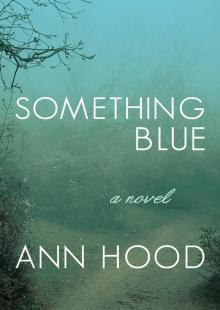 Something Blue
Something Blue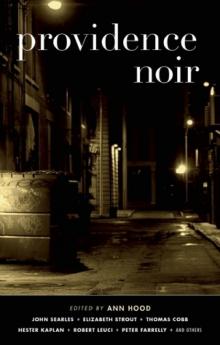 Providence Noir
Providence Noir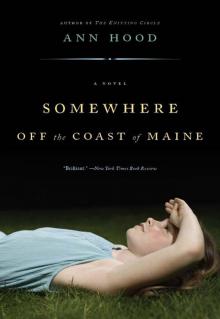 Somewhere Off the Coast of Maine
Somewhere Off the Coast of Maine Jewel of the East
Jewel of the East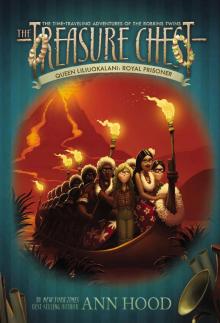 Queen Liliuokalani: Royal Prisoner
Queen Liliuokalani: Royal Prisoner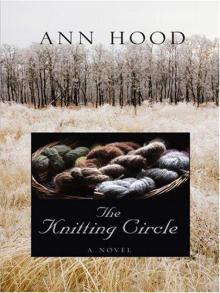 The Knitting Circle
The Knitting Circle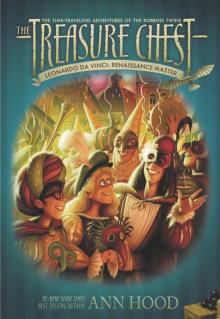 Leonardo da Vinci: Renaissance Master
Leonardo da Vinci: Renaissance Master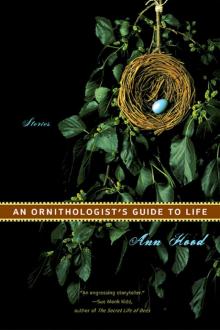 An Ornithologist's Guide to Life
An Ornithologist's Guide to Life The Red Thread
The Red Thread She Loves You (Yeah, Yeah, Yeah)
She Loves You (Yeah, Yeah, Yeah)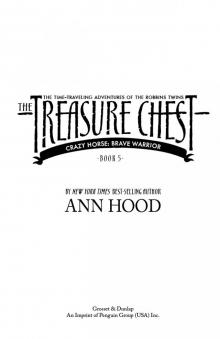 Brave Warrior
Brave Warrior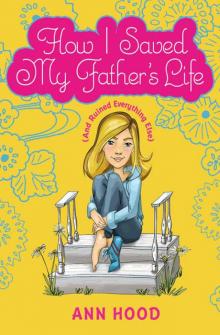 How I Saved My Father's Life (and Ruined Everything Else)
How I Saved My Father's Life (and Ruined Everything Else) An Italian Wife
An Italian Wife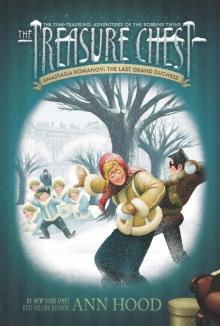 Anastasia Romanov: The Last Grand Duchess #10
Anastasia Romanov: The Last Grand Duchess #10 Prince of Air
Prince of Air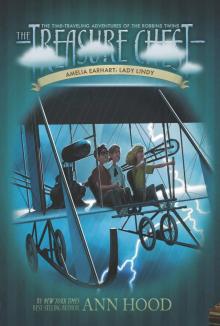 Amelia Earhart: Lady Lindy
Amelia Earhart: Lady Lindy Places to Stay the Night
Places to Stay the Night Little Lion
Little Lion Comfort
Comfort Angel of the Battlefield
Angel of the Battlefield